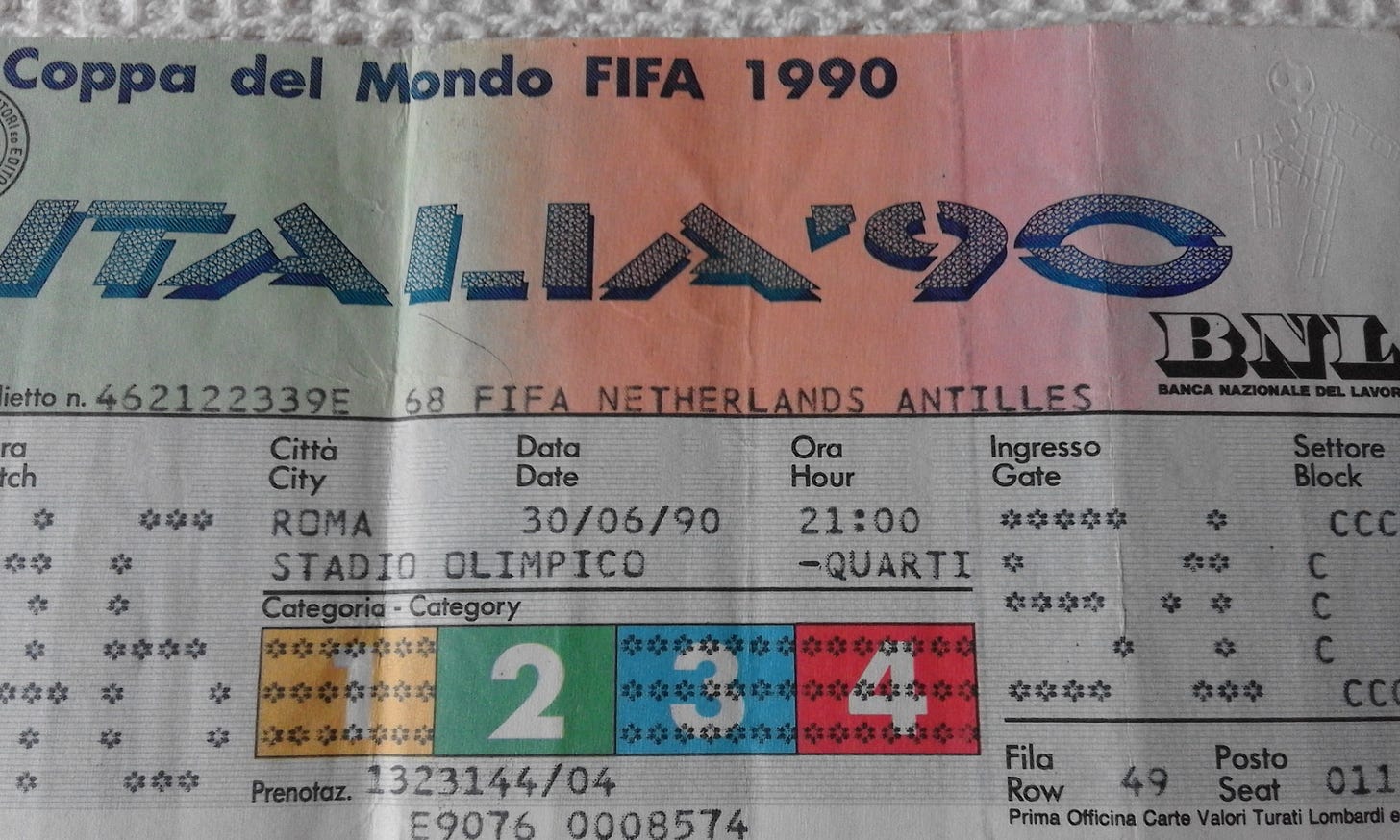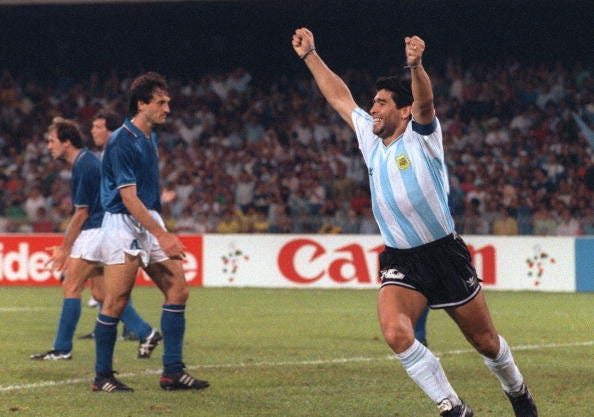ITALIA '90 AND ITALY'S NIGHTMARE IN NAPLES
Having won all their games in Rome at World Cup '90 Italy faced Argentina and Diego Maradona in a semi-final of heartbreak in Naples
“Never leave Rome,” so the saying goes. Once you do, nothing will ever be the same again - and so it proved for the Italian national football team at Italia ‘90.
The Azzurri had ridden the crest of a wild wave of emotion inside the Stadio Olimpico in Rome throughout the 1990 World Cup up until the semi-final stage when they were forced to decamp to Naples where Diego Maradona of all people and his uncompromising Argentina awaited.
July 3, 1990, would be the day that Italians longed for the hostile environment of the Capital rather than the relatively benign surroundings of the Stadio San Paolo - as it was known then - where the Neapolitan public could not bring themselves to boo or whistle the Argentine national anthem.
For anyone living in Italy throughout the tournament it had been one long procession of Notti Magiche - Magical Nights - searching for a goal, under an Italian summer sky, or so went the words to the official anthem which had been blasting out from every corner at every hour up until that fateful night in early July.
Rome in particular had decided to put all its energy into driving the national team towards victory on home soil; by day its citizens nonchalantly strolling the streets seemingly doing nothing but obviously doing something, by night transforming into a mass of flag-waving, car honking carousers, clogging the streets well into the early hours.
Each victory only heightened expectations further and it was nigh impossible not to jump on for the ride as in the group stage Austria and USA were dispatched by the very Italian scoreline of one-nil while in the final outing before the knockouts Roberto Baggio scored one of the most memorable goals of any World Cup, producing a mazy dribble then a step over and low finish in a two-nil “rout” of Czechoslovakia.
The mornings after each victory became unofficial national holidays as the Romans turned into tourists and took up residence at outside tables to relive every moment of the previous night’s game. The main talking points revolved around whether the free-spirited Baggio should start every game and the rise of Salvatore Schillaci as the new Paolo Rossi - the goal hero of the 1982 World Cup winning side.
They were intoxicating times where the other matches in the tournament were followed with one eye on Italy’s potential opponents in the knock-out stage, with the general consensus of opinion being that the formidable West Germany were the only real danger.
Little thought had been given to Argentina who most expected to exit at the hands of Brazil in the last sixteen, but when they sent their bitter South American rivals packing and then crept through on penalties against Yugoslavia in the quarters the spectre of a meeting in Maradona’s adopted city loomed large.
Italy had continued to enjoy the home comforts of Rome, seeing off Uruguay two-nil, with Schillaci, who scored again, and Baggio now seemingly permanent fixtures in the starting line-up.
Surprise package Ireland arrived in Rome for the quarter-finals, conveying what seemed a laissez faire approach to their surroundings, even finding time to unsettle the locals by grabbing a Papal audience on the eve of the game.
Surely, God could only be on the side of Italy and in a tense encounter it was divine intervention of sorts from Schillaci that settled the outcome. The little Sicilian netted the only goal just before half-time in what was a manic display of non-stop running where he also saw a thunderous free-kick come back off the underside of the bar and had a goal disallowed for a marginal, if that, offside.
The final whistle brought a fanfare of flag waving and a send off with the promise of a triumphant return for the final.
However, the team was heading out of Rome on the back of five wins and no goals conceded for uncharted waters and waiting to muddy them further was the arch-agitator Maradona.
Argentina had kicked, scratched and generally annoyed everyone on their way to the semi-finals and in Naples they felt at home to get down and dirty.
Maradona was well versed in the country’s north-south divide and attempted a local coup d’etat when he questioned whether the city should really be supporting a country that he felt, “only makes Naples feel important for one day of the year but for the rest ignores it.”
He had already cast aspersions over the north after the defending champion’s opening game defeat to Cameroon at San Siro in Milan by claiming that for one day they had stopped being racist by cheering for an African country.
Now he was dividing a country or so it seemed as the Neapolitans had to justify their allegiance, with news crews quickly dispatched around the city to gauge where their hearts lay.
Italy must have felt they weren’t exactly at home when Maradona was given a rousing cheer when he trotted out for the warm-up onto a pitch he knew so well and then when the Argentine anthem was met with a respectful silence.
Coach Azeglio Vinci was definitely feeling the pressure and reverted to defensive type by dropping the creative Baggio to the bench for a more prosaic midfield.
In Rome, giant screens had been erected all over the city. No one could stand the tension of being at home and of course being outside meant it would be easier to hop onto a moped or jump into a car for a celebratory tour at the final whistle.
Instead of which, the suffocating heat of the night became unbearable when Claudio Caniggia scored to cancel out Schillaci’s opener.
And the lights went out when Italy missed the decisive spot-kick in the penalty shoot-out. In Rome, as no doubt throughout the country, there was stunned silence and then slumped shoulders disappearing into the gloom though at the site of one outdoor screen a local decided to take his frustrations out on his moped à la “John Cleese in Fawlty Towers” by giving it a “damn good thrashing”.
The moped remained impassive throughout the assault as the assailant finally gave up and jumped on to speed off into the darkness.
By the next morning, the flags and bunting around Rome had all but gone and a mid-summer melancholia no one had expected was now descending. The bars went back to serving un caffè a veloce - a shot of coffee and out the door - as everyone tried to get their lives back on track.
No one was in the mood for watching the final but those who had tickets, expecting Italy to be there, would exact a revenge of sorts on Maradona and Argentina by employing all their rage and anger in drowning out their national anthem, leaving an enraged Maradona to mouth “hijos de puta” as the camera panned along.
It would be the beginning of the end for the magical number 10’s time in Italian football but that’s another story, in the meantime those Notti Magiche had come to an end in the cruelest of ways.
As a footnote, West Germany won the final with a penalty six minutes from time while Argentina had two players sent off and Maradona burst into tears at the final whistle. Italians up and down the country knew how he felt even if sympathy was in short supply.







